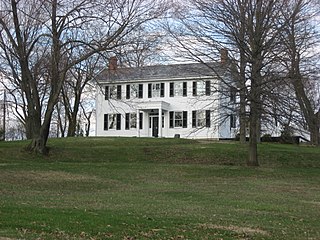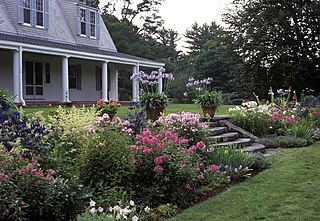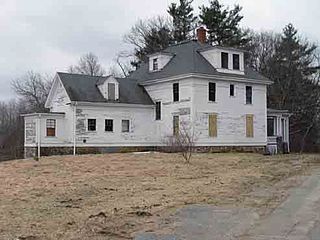
Forest Hill is a neighborhood in the city of Newark in Essex County, New Jersey, United States. It is a pre-World War II neighborhood in the North Ward. It is bounded on the west by Branch Brook Park, on the south by Bloomfield Avenue, and on the east by both Summer and Mt. Prospect Avenues, the neighborhood of Broadway. The neighborhood's ZIP code is 07104.

The Shepherd Brooks Estate is an historic property at 275 Grove Street in Medford, Massachusetts. The 82-acre (33 ha) property is owned by the city of Medford, and managed by a trust established to preserve the property. Its principal feature is the manor house constructed in 1880 by Shepherd Brooks, a member of a prominent Medford family, and is the only major 19th-century estate to survive relatively undeveloped in the city. The grounds are open to the public daily from dawn to dusk, and tours of the house are available during the summer.

The Walker House is a Queen Anne Revival private residence located in Garrison, New York that is listed on the National Register of Historical Places. It was constructed in 1888 by a prominent railroad executive on his own Garrison estate as a summer cottage wedding present for one of his daughters. Garrison is located in the Hudson Valley approximately 40 miles north of New York City and sits on the eastern bank of the Hudson River, directly across from West Point.

The James Beach Clow House is a historic house in northern Beaver County, Pennsylvania, United States. Located in North Sewickley Township near the community of Ellwood City, the house is a rare surviving example of 19th-century Greek Revival farmhouses in Beaver County.

Stonehenge, also known as Stone Cottage or High House, is a historic summer estate house on Windmill Hill Road in Dublin, New Hampshire. Built in 1889, it is one of the first summer houses to be built in eastern Dublin, and was a centerpiece of the extensive holdings of the Parsons family. The house was listed on the National Register of Historic Places in 1983.

The Fells, also known as the Hay Estate, was originally the summer home of John Milton Hay, a 19th-century American statesman. It is located in Newbury, New Hampshire, on New Hampshire Route 103A, 2.2 mi (3.5 km) north of its junction with New Hampshire Route 103.

The Moses Kent House is a historic house on River Road in Lyme, New Hampshire. Built in 1811, it is a good local example of Federal period architecture, most notable for the well-preserved murals on its interior walls, drawn by the itinerant artist Rufus Porter. The house was listed on the National Register of Historic Places in 1984.

The Weeks House, also known as the Old Brick House, is a historic house museum on Weeks Avenue in Greenland, New Hampshire. Built about 1710, it is one of the oldest brick buildings in New England. It was built by an early colonial member of New Hampshire's politically prominent Weeks family, and is now maintained by a family association. The house was listed on the National Register of Historic Places in 1975.

True Farm is a historic farm and summer estate in Holderness, New Hampshire. Located off New Hampshire Route 113 on True Farm Road, the farm is based around a c.1820 farmhouse, and was expanded into a summer estate in 1920 by George Saltonstall West. The 100-acre (40 ha) estate includes numerous outbuildings and a lakefront cottage. The farm was listed on the National Register of Historic Places in 2012.

The Beech Hill Summer Home District encompasses a collection of six early 20th century summer houses in Harrisville, New Hampshire, built on a ridge overlooking Dublin Pond with views of nearby Mount Monadnock. The properties, a number of which were built for members of the Thayer family, lie on Mason Road, just north of the town line with Dublin. The most significant property of the six is the 140-acre (57 ha) Skyfield estate, whose large Georgian Revival mansion was designed by Lois Lilley Howe and built in 1916. The district is also notable as containing archaeological remnants of 18th century farmsteads, for which reason its properties are also listed in the Harrisville Rural District. The district was listed on the National Register of Historic Places in 1988.

The Buckminster-Kingsbury Farm is a historic farmhouse at 80 Houghton Ledge Road in Roxbury, New Hampshire. The brick house was built c. 1825, and is a well-preserved example of vernacular Federal and Greek Revival styling. The house was listed on the National Register of Historic Places in 2011.

The Clymer House is a historic house at 31 Clymer Road in Harrisville, New Hampshire. Built in 1932, it is a finely crafted example of Colonial Revival architecture, built in conscious imitation of an earlier form that might have occupied the same site. The house was listed on the National Register of Historic Places in 1988.

Beede Farm is a historic farm and summer estate at 178 Mill Bridge Road in Sandwich, New Hampshire. The property includes a c. 1830s farmhouse that was erected by John Beede, whose uncle, Daniel Beede, was responsible for platting out much of Sandwich. The 303-acre (123 ha) includes a family cemetery. It was transformed into a summer estate in 1938. The farm was listed on the National Register of Historic Places in 2012.

The Chocorua Lake Basin Historic District is a large historic district surrounding Chocorua Lake in the town of Tamworth, New Hampshire. It includes more than 6,000 acres (2,400 ha), with the lake roughly at its center, extending from Washington Hill Road in the east to Fowles Mill Road and Philbrick Neighborhood Road in the west, and from the town line with Albany in the north to Heavenly Hill Road in the south. The district's significance derives from a large cluster of late 19th and early 20th century summer resort houses built around and near the lake, and the role the area's landowners have played in the conservation of the lake and viewsheds associated with it and nearby Mount Chocorua. The district was listed on the National Register of Historic Places in 2005.

The Captain Enoch Remick House is part of a historic homestead located in the town of Tamworth, New Hampshire, United States. In 1996, the house—along with a complex of five surrounding outbuildings and approximately 69 acres (28 ha) of field, pasture and woodland—was listed on the National Register of Historic Places for its significance in art, architecture, and local agriculture. It now operates under the auspices of the Remick Country Doctor Museum & Farm.

The Richman Margeson Estate was a historic summer estate in Newington, New Hampshire. Formerly located in the Great Bay National Wildlife Refuge but not open to the public, the house was demolished in 2016. The main house, built in 1894, was a rare example of a Colonial Revival estate house in the state and was the only summer estate house of its scale to survive in Newington into the 21st century. The estate was listed on the National Register of Historic Places in 1990.

The Hanckel-Barclay House, also known as Chestnut Hill, is a historic house in the Dunn's Rock community near Brevard, Transylvania County, North Carolina, bordered by the French Broad River and US Highway 276. The house was listed on the National Register of Historic Places in 1999.
Open to the public 365 days a year, dawn to dusk, the Beaver Brook Association is a non-profit nature center a 4,000-acre (1,600 ha) conservation area in Hollis, Brookline, and Milford, New Hampshire, United States. It takes its name from Beaver Brook, a tributary of the Nissitissit River and Nashua River.

The Murray–Isham Farm, or more recently just the Isham Family Farm, is a historic farm property at 3515 Oak Hill Road in Williston, Vermont. The farm has been in active use since about 1850, most of them by the Isham family. The farmstead includes a c. 1850 Gothic Revival house and farm buildings of similar vintage. It was listed on the National Register of Historic Places in 1992, and is the subject of a conservation easement preserving its agricultural character.

The Hurley Road Historic District encompasses a pair of rural 19th-century properties built by members of a single family at 6 and 17 Hurley Road in Southbury, Connecticut. Included are Federal and Greek Revival houses, and a number of outbuildings, giving the cluster a distinct period feel. The area was listed on the National Register of Historic Places in 1993.






















